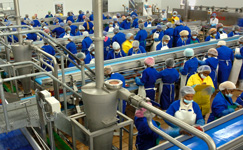South Africa launches new industrial policy
8 May 2015
The seventh issue of the Department of Trade and Industry's Industrial Policy Action
Plan (Ipap), launched on 7 May, highlights the development of a specific support
framework for black industrialists.
In terms of Ipap 2015, the Black Industrialists Development Programme will be
established over the coming year. It will be aimed at promoting industrialisation,
sustainable economic growth and transformation through the support of black-
owned entities in the mainstream of the South African manufacturing industry and
related manufacturing sectors.
Briefing reporters at the Industrial Development Corporation (IDC) in Johannesburg
at the launch, Minister Rob Davies said the government would focus on the
programme. "If we are focusing on the manufacturing sector we need to ensure that
the manufacturing sector becomes much more representative of the demographics
of our people, but more importantly that the manufacturing sector
benefits from the
available pool of talent from the country and the population as a whole."
In March, the department said it would avail R1-billion in support of the programme
with the initial aim being to support 100 black industrialists. "Becoming an
industrialist is not an easy task. It requires passion and a skills set and capabilities.
What we are going to be doing is we are focusing on a particular programme which
will identify and support black industrialists," Davies said on Thursday.
Access to finance and markets
According to the document, the programme envisages implementing key measures
such as access to finance, access to markets, skills development, standards, quality
and productivity improvements by black manufacturing companies.
Recommendations from commissions reporting back at the Black Industrialists
Indaba held in March included that a committee comprising the government, the
private sector and co-opted experts
be established to explore more ways to
accelerate the implementation of the programme. It was also agreed that the
Preferential Public Procurement Act be reviewed and that the setting of the black
majority threshold be at 75% for companies qualifying for the programme.
Skills development will be placed at the core of the programme.
The IPAP said that in the 2015/16 year, the programme would be designed,
developed and structured. According to the document, the development of the
programme would be overseen by the Department of Trade and Industry as the
lead, with supporting agencies such as the IDC and the Development Bank of
Southern Africa.
Industrialisation in history
Davies also said the manufacturing sector played an important role in South Africa's
economy. "The manufacturing sector and value addition remain critical objectives of
achieving the kinds of structural changes that are necessary to place our economy
on a higher
level of more inclusive growth."
History had shown that industrialisation was a necessity. "The lessons that we've
drawn and which is also the common understanding of the African continent, is that
industrialisation is necessary because if we don't industrialise we are trapped in the
most disadvantageous place in the global division of labour as producers and
exporters of primary products and as importers of finished goods.
"That is the most disadvantageous position to be in because the real value in value
chains lies in the parts that take place after the delivery of the primary materials."
An important sub-theme that formed part of radical economic transformation, he
said, was that the government was expected to increase the impact of industrial
policy measures.
"This Ipap also represents our intent to progressively upscale our industrial policy.
What is clear to all of us is that this economy has not had sufficiently fast inclusive
economic growth, [gross domestic product] growth has not been high enough and
the growth that we've had has not been inclusive enough to place us in a position
where we can see a significant dent in the levels of poverty, inequality and
unemployment in our country," Davies explained.
The target in the Medium Term Strategic Framework was for 5% of inclusive growth
to have been delivered by the end of this term in government. The latest Ipap, as
well as previous iterations, indicated the actions that different government entities
needed to carry out to support industrialisation.
"What we are doing is that we are creating an environment," said Davies. "We are
creating a support package of measures; we are creating a defensive framework
that will allow manufacturing activities to flourish in South Africa. That's what it's
about."
A total of 3 384 private sector enterprises across all provinces were provided with
incentive and other support in
2014 to the value of R13.6-billion.
The chairman of the Manufacturing Circle, Bruce Strong, welcomed the Ipap, saying
that South Africa's growth was tied to the health of manufacturing.
Source: SAnews.gov
 At Island Way Sorbet, a food processing company based in the Coega Industrial Development Zone in Port Elizabeth, baby peppers are prepared for pickling and bottling. (Image: MediaClubSouthAfrica.com: Rodger Bosch)
At Island Way Sorbet, a food processing company based in the Coega Industrial Development Zone in Port Elizabeth, baby peppers are prepared for pickling and bottling. (Image: MediaClubSouthAfrica.com: Rodger Bosch)





